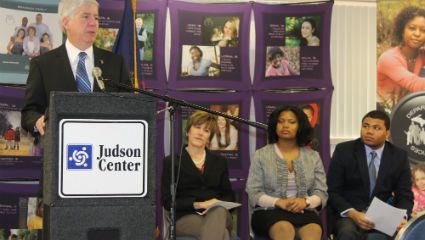
Wayne State’s Transition To Independence Program (TIP), a School of Social Work initiative that provides academic, financial and social support services to students transitioning out of the foster care system, shared the spotlight at a Feb. 27 media event unveiling a government-led initiative to reform the funding and delivery of child welfare services throughout Michigan.
The event, attended by Gov. Rick Snyder and Michigan Department of Human Services Director Maura Corrigan, accompanied the release of a report developed by leaders from state government, private agency providers, courts, and counties that recommends sweeping changes to the state’s child welfare system. Among other things, the report proposes that just one agency provider manage a child’s case and calls for a performance-based funding model that would require greater accountability for child outcomes.
Among those speaking at the event, hosted by the Royal Oak-based Judson Center, was Kevin Riedel, a sophomore at Wayne State University and an alumnus of the state’s foster care system. Riedel spoke of the toll that frequent foster family placements and multiple caseworkers took on his grades, dragging his high school GPA from a 4.0 down to a 0.8 and devastating his self-esteem and prospects for college admittance. Now a straight-A student and aspiring social work major, Riedel credited the university’s TIP program for being a “consistent and reliable source” for help obtaining housing, academic advising, life skills, counseling, and myriad other services.
Established in the fall of 2012 with funding from the Michigan Department of Human Services, TIP partners with Detroit-area organizations to provide Wayne State students transitioning out of foster care with professional mentoring, legal representation, financial literacy, health care, and other services. The program employs a full-time life skills coach to provide program participants with additional support and appoints staff – dubbed “foster youth champions” – to serve as liaisons between WSU foster youth and key university offices, including Financial Aid; Counseling and Psychological Services; Career Services; Housing and Residential Life; and the Campus Health Center.
TIP Director Angelique Day, assistant professor of social work and an expert in the area of foster youth education, said TIP “shows that Wayne State is taking the lead in understanding the importance of connecting not just to the urban community, but to the state as a whole. We are at the forefront of training social workers, ensuring excellent service delivery, and changing policy.”
Elizabeth Delores Dungee-Anderson, the School of Social Work’s associate dean for academic affairs, said Wayne State is positioned to be an important resource for the government and agencies as they work to improve policy and service delivery under the new initiative. Both TIP and the school’s Center for Social Work Research, she said, provide experience and expertise in evaluating and recommending programmatic improvements and outcomes.
